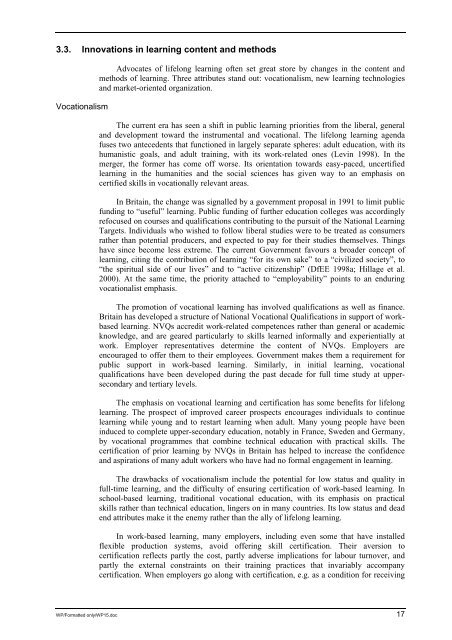Lifelong learning - International Labour Organization
Lifelong learning - International Labour Organization
Lifelong learning - International Labour Organization
You also want an ePaper? Increase the reach of your titles
YUMPU automatically turns print PDFs into web optimized ePapers that Google loves.
3.3. Innovations in <strong>learning</strong> content and methods<br />
Vocationalism<br />
Advocates of lifelong <strong>learning</strong> often set great store by changes in the content and<br />
methods of <strong>learning</strong>. Three attributes stand out: vocationalism, new <strong>learning</strong> technologies<br />
and market-oriented organization.<br />
The current era has seen a shift in public <strong>learning</strong> priorities from the liberal, general<br />
and development toward the instrumental and vocational. The lifelong <strong>learning</strong> agenda<br />
fuses two antecedents that functioned in largely separate spheres: adult education, with its<br />
humanistic goals, and adult training, with its work-related ones (Levin 1998). In the<br />
merger, the former has come off worse. Its orientation towards easy-paced, uncertified<br />
<strong>learning</strong> in the humanities and the social sciences has given way to an emphasis on<br />
certified skills in vocationally relevant areas.<br />
In Britain, the change was signalled by a government proposal in 1991 to limit public<br />
funding to “useful” <strong>learning</strong>. Public funding of further education colleges was accordingly<br />
refocused on courses and qualifications contributing to the pursuit of the National Learning<br />
Targets. Individuals who wished to follow liberal studies were to be treated as consumers<br />
rather than potential producers, and expected to pay for their studies themselves. Things<br />
have since become less extreme. The current Government favours a broader concept of<br />
<strong>learning</strong>, citing the contribution of <strong>learning</strong> “for its own sake” to a “civilized society”, to<br />
“the spiritual side of our lives” and to “active citizenship” (DfEE 1998a; Hillage et al.<br />
2000). At the same time, the priority attached to “employability” points to an enduring<br />
vocationalist emphasis.<br />
The promotion of vocational <strong>learning</strong> has involved qualifications as well as finance.<br />
Britain has developed a structure of National Vocational Qualifications in support of workbased<br />
<strong>learning</strong>. NVQs accredit work-related competences rather than general or academic<br />
knowledge, and are geared particularly to skills learned informally and experientially at<br />
work. Employer representatives determine the content of NVQs. Employers are<br />
encouraged to offer them to their employees. Government makes them a requirement for<br />
public support in work-based <strong>learning</strong>. Similarly, in initial <strong>learning</strong>, vocational<br />
qualifications have been developed during the past decade for full time study at uppersecondary<br />
and tertiary levels.<br />
The emphasis on vocational <strong>learning</strong> and certification has some benefits for lifelong<br />
<strong>learning</strong>. The prospect of improved career prospects encourages individuals to continue<br />
<strong>learning</strong> while young and to restart <strong>learning</strong> when adult. Many young people have been<br />
induced to complete upper-secondary education, notably in France, Sweden and Germany,<br />
by vocational programmes that combine technical education with practical skills. The<br />
certification of prior <strong>learning</strong> by NVQs in Britain has helped to increase the confidence<br />
and aspirations of many adult workers who have had no formal engagement in <strong>learning</strong>.<br />
The drawbacks of vocationalism include the potential for low status and quality in<br />
full-time <strong>learning</strong>, and the difficulty of ensuring certification of work-based <strong>learning</strong>. In<br />
school-based <strong>learning</strong>, traditional vocational education, with its emphasis on practical<br />
skills rather than technical education, lingers on in many countries. Its low status and dead<br />
end attributes make it the enemy rather than the ally of lifelong <strong>learning</strong>.<br />
In work-based <strong>learning</strong>, many employers, including even some that have installed<br />
flexible production systems, avoid offering skill certification. Their aversion to<br />
certification reflects partly the cost, partly adverse implications for labour turnover, and<br />
partly the external constraints on their training practices that invariably accompany<br />
certification. When employers go along with certification, e.g. as a condition for receiving<br />
WP/Formatted only/WP15.doc 17

















